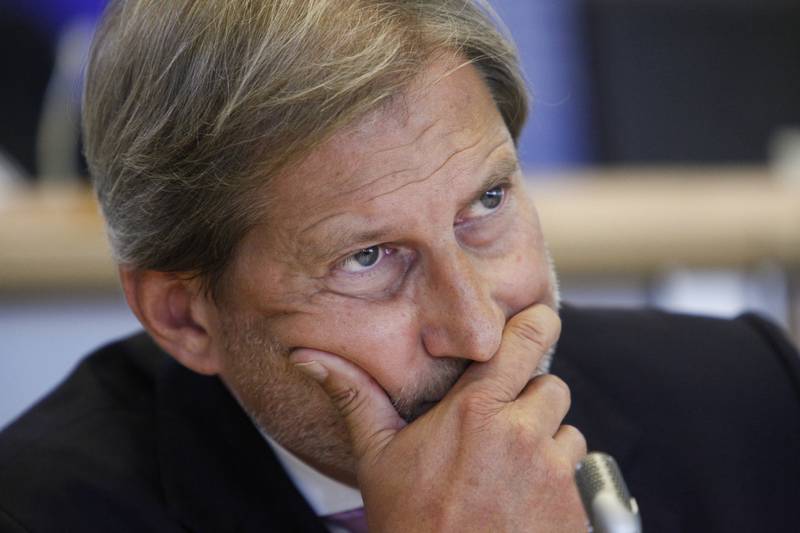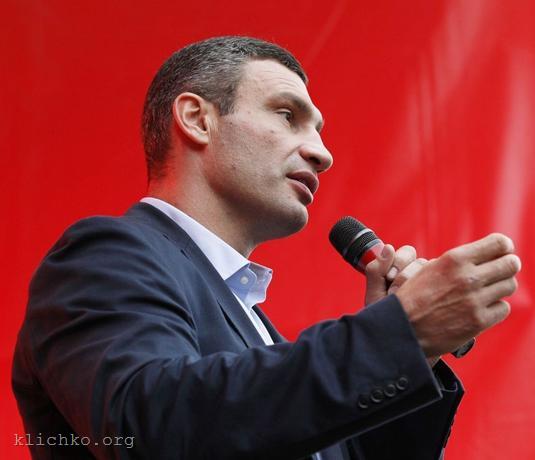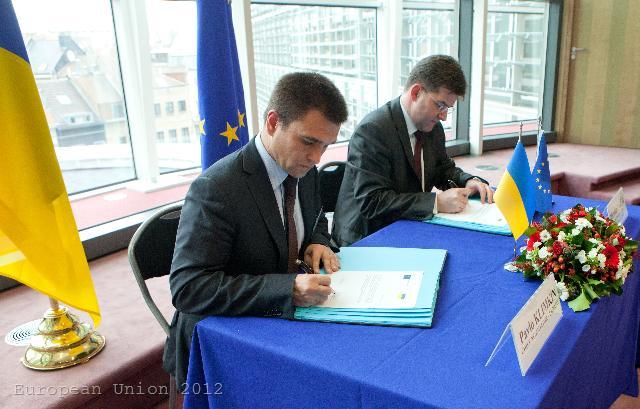Ukraine - from Disappointment to Understanding
Adelina Marini, April 9, 2012
 More than 20 years after the fall of the Berlin wall Bulgaria has been a member of the EU for five years, of NATO for more but not of the OECD (Organisation for Economic Cooperation and Development). Nevertheless, if looked from above, everyone would think that this is the country that can be a role model for its neighbours from the Western Balkans and the Eastern Partnership to avoid the mistakes from the transition. This is what I thought while fighting to enter as not accredited journalist to the national parliament in Bulgaria to attend a rare event - inter parliamentary meeting Bulgaria-Ukraine.
More than 20 years after the fall of the Berlin wall Bulgaria has been a member of the EU for five years, of NATO for more but not of the OECD (Organisation for Economic Cooperation and Development). Nevertheless, if looked from above, everyone would think that this is the country that can be a role model for its neighbours from the Western Balkans and the Eastern Partnership to avoid the mistakes from the transition. This is what I thought while fighting to enter as not accredited journalist to the national parliament in Bulgaria to attend a rare event - inter parliamentary meeting Bulgaria-Ukraine.
Who else if not Bulgaria could point to Ukraine where it can stumble over? Bulgaria is not a country from Central Europe, which in the past and during the long and painful period of the Cold War had the benevolent economic and political influence of Western Europe. Bulgaria was always a subject of predatory interest by Russia, a country which Bulgaria maintains strong warm feelings for ever since the time of the Russian-Turkish war, called in Bulgaria "liberation" war. Although it was never part of the Soviet Union, Bulgaria was always pretty close to Moscow and therefore can very well understand the problems Ukraine is currently facing.
This is why my expectations from such an inter parliamentary meeting were that strong messages would be conveyed by Bulgaria that with strong domestic politics, consolidated national support for the formulation of national interests in Ukraine the country could detach itself gradually from its dependence on Russia (economic and political), and to come closer to the EU. That fighting corruption and shadow economy would bring the country the so much needed wealth; that unsuccessful privatisation, whereas viable state assets were sold to oligarchs, left to act the way they want, is harmful and Bulgaria has a bitter experience with this.
That consensus has to be built once and for all regarding Russia, in order to avoid the constant division of society to rusophiles and rusophobes on not important and strategically significant issues. That rule of law means to ensure that everyone, but really everyone, are equal before the law, because this would bring investment and growth and because Bulgaria again has bitter experience of joining the EU, stained with "incapable of ensuring rule of law", masked by the name Control and Verification Mechanism in the area of justice and home affairs. A problem, because of which all subsequent candidate countries from the region will start their negotiations from the relevant chapters first (chapters 23 and 24).
And these expectations are not only mine. Similar expectations are outlined by Pekka Sutela from Carnegie think-tank in his very thorough economic analysis of Ukraine. "Some have hoped that international organisations would provide Ukraine with economic stability and encourage reform-making. Bulgaria and Romania, for example, have benefited greatly from the prospect of European integration and the policy anchors that provides. One IMF study estimates that were Ukraine to reach the Romanian level of institutional standards by 2015, the economy would grow by 8.5 percent annually. If it continues to lag in institutional development, Ukraine would have growth of just 2.5 percent annually".
But Bulgaria could have said all this to its Ukrainian partners should it had fought successfully these problems, should they were in the past. Instead, the brief and quite boring meeting reminded more or less of a socialist party gathering, during which everyone speaks without much order, usually sharing their own impressions, not caring at all about the rest. At the gathering spoke President Zhelyu Zhelev, the first democratically elected president and a key figure of Bulgaria's transition, but he first among all the rest should have said: Dear Ukrainian friends, we messed up our transition very much, please do not repeat our mistakes for anything in the world. Then he had to list these mistakes. Instead, he started remembering some things of his own, somehow related to Ukraine.
The former speaker of the national parliament, Georgi Pirinski, mentioned the long lasting friendly relations with Ukraine, excused himself that he had work to do and left. From Bulgarian side also spoke former Deputy PM Lidia Shuleva, who is currently working as a consultant to the Ukrainian government in the area of social and administrative reform, who also refrained from saying which our mistakes were and what Ukraine was missing to draw as conclusions. Against this background, the Ukrainian delegation, a bit despondent by this not very serious welcoming, took the floor and clearly stated their expectations - visa-free movement in the EU, moving forward the Association Agreement, part of which is the creation of the first of its kind deep and comprehensive free trade area. By the way, this is an issue the Ukrainians raise every time they have contact with the EU. Every time. Flawlessly.
The agreement was initialled on March 30th, but in order it to be moved toward a process of signing and ratification the EU expects from Ukraine to ensure independence of the judiciary from political influence. For euinside the leader of the delegation, Oleksiy Plotnikov, Chairman of the Subcommittee for International Economic Policy in the Ukrainian Rada, commented that for Ukraine the agreement was important but said nothing more than that.
Nonetheless, it is an indisputable fact that was it not for the European integration Bulgaria would have probably be in the same rankings in which Ukraine is. This makes endorsing the European standards extremely important as for the political and social development, so for the economic development. This is why it is important for us to see where Ukraine is at the moment, according to the Carnegie analysis and to look carefully at all the parallels which we will find with Bulgaria. It is important to note in the very beginning that Pekka Sutela's analysis is based on initially very high expectations, which were probably due to the not very good understanding of what Ukraine is, part of what it was and where it is at the moment.
He starts his analysis precisely with the 1991 expectations, when Ukraine gained its independence from the Soviet Union, that bright future awaited the country soon, with wealthy free market democracy and full fledged membership to the Euro-Atlantic communities. The hopes then were the biggest country, geographically entirely in Europe, the fifth largest in terms of population, to become a member of the EU, NATO and the OECD. The disappointment 20 years later is big, because nothing of this not only that is not a fact but now it is even difficult to forecast when and whether it can be achieved at all. Now the bitter reality seems to be realised that Ukraine is ill, as the  analyst writes, and there is a risk for it to turn into a failed country, thanks to its geographic situation, historic burden and the mistakes from the transition.
analyst writes, and there is a risk for it to turn into a failed country, thanks to its geographic situation, historic burden and the mistakes from the transition.
Given what was Ukraine's starting point in 1991, it is really odd why there were so high expectations back then. Of course, the period then was very romantic, dynamic, Europe was all over blown by the "wind of change" and obviously this was the reason for the not so sober view on reality. In Carnegie's analysis it is pointed out that in 1991 Ukraine was one of the poorest Soviet republics. The then statistics (the author warns that they might not be very reliable) show that the gross domestic product per capita was $1,307. Separate from the bad starting position, another big problem of Ukraine, according to the analysis, was that the country was severely hit by the lack of any organisation of the transition.
"As nation building came to dominate the first years following Ukraine’s independence, politics were in continued turmoil and centred around jockeying for power. Economics therefore suffered", the analyst thinks. GDP contracted annually between 9.7% and 22.7% in the period 1991-1996. Hyperinflation followed and a gigantic drop of production for a country that was not ravaged by war. Only in 2000 growth resumed. The budget deficit was 14.4% of GDP, barter and the use of surrogate money and foreign currency prevailed. Shadow economy started slowly but steadily to take over the place of the state in the collapsed economy.
The analysis quotes the famous political scientist Francis Fukuyama, who gives Ukraine as an example of how a simple change of the regime from authoritarian to democratic government would not succeed without “a long, costly, laborious, and difficult process of institution building.” Even after the initial process of privatisation the state is unable to protect the newly acquired property because the assets continue to be divided and wealth sucked out by corruption and powerful vested interests. "And that is what tragically happened in Ukraine. Behind the facade of an electoral democracy, both inherited and newly arisen economic structures held on to actual power. These usually regionally based structures are more often than not personified as oligarchs controlling key industries of the country. Sometimes the dividing line between legitimate capitalists and plain criminals is blurred, and elected politicians may be little more than covers for their interests", Carnegie's analysis goes on.
The problems Ukraine's future is facing are several, yet fundamental. One of them is deteriorating demographic picture with constantly growing pension burden. At the moment the population of the country is 46 million, down from 52 million in the beginning of the transition. The expenditures for pensions have grown from 9.2% of GDP in 2003 to 18% in 2009. This is one of the biggest pension burdens in the world. The country's competitiveness is low and business environment remains complex. The public sector is huge, ineffective and with high wages. In the general case, the majority of voters are either pensioners or public employees. At the moment Ukraine is working on a programme with the IMF but this would not last for long, which is why the country is expected to ask Russia for financial assistance, which, as Pekka Sutela writes, will come at a price.
Another big problem of Ukraine is the huge shadow economy. The data vary, but still they give some idea - in 1998 informal economy's share was 31.1% of GDP, other data point out to a 60 percent share. According to the World Bank, the share of grey economy in 2007 dropped from 52.7% to 46.8%, but still it is more than in Kazakhstan (38.4%), Tajikistan (41%) and Russia (40.6%). The country's economy in the past 20 years has not been restructured and a large share of it is held by agriculture, thanks to the fertile lands (black earth) and the good climate forecasts. According to the expectations for climate change, the Mediterranean will suffer from continuous drought, which will make Ukraine a preferable supplier of agriculture produce. The problem is though that this sector too is not reformed, ineffective and expensive.
 Ukraine is still relying on subsidised price of natural gas. This is why Carnegie's recommendation is the country to get rid of its energy dependence from Russia (estimated to be 70%), as well as from its dependence on external funding. Flourishing corruption prevents Ukraine from completing the transition to a genuine market economy. Moreover, energy geopolitics will play badly for Ukraine. According to Carnegie, nowhere else the details on gas transit through Ukraine are not so obscure. The country has almost a monopolistic situation in terms of gas transit for Europe. Russia, however, is working hard on diversifying transit - the Nord Stream pipeline is now ready. No matter of the high costs for construction, Carnegie quotes a research of the Cambridge university, according to which the two pipelines from Russia to Germany have a good economic perspective. Besides, the newly built pipes will cost less than the maintenance of the old ones. The motives behind the intention for construction of South Stream are the same.
Ukraine is still relying on subsidised price of natural gas. This is why Carnegie's recommendation is the country to get rid of its energy dependence from Russia (estimated to be 70%), as well as from its dependence on external funding. Flourishing corruption prevents Ukraine from completing the transition to a genuine market economy. Moreover, energy geopolitics will play badly for Ukraine. According to Carnegie, nowhere else the details on gas transit through Ukraine are not so obscure. The country has almost a monopolistic situation in terms of gas transit for Europe. Russia, however, is working hard on diversifying transit - the Nord Stream pipeline is now ready. No matter of the high costs for construction, Carnegie quotes a research of the Cambridge university, according to which the two pipelines from Russia to Germany have a good economic perspective. Besides, the newly built pipes will cost less than the maintenance of the old ones. The motives behind the intention for construction of South Stream are the same.
Ukraine has no chance to compete actively with these pipes and risks losing revenues from transit fees, as well as one of its leverages to press for low gas prices. This is why the analyst recommends Ukraine to create transparency in its transport business of gas. In conclusion Pekka Sutela from Carnegie points out that Ukraine is facing a single choice - to become effective with its own efforts or to continue performing badly. In the first case it would be hard but not impossible. But the more important conclusion is: "The future is in Ukrainian hands, not in those of outsiders, either Western or Eastern". By the way, this is a conclusion absolutely valid for Bulgaria too.
 Johannes Hahn | © European Parliament
Johannes Hahn | © European Parliament | © klichko.org
| © klichko.org | © European Union 2012
| © European Union 2012